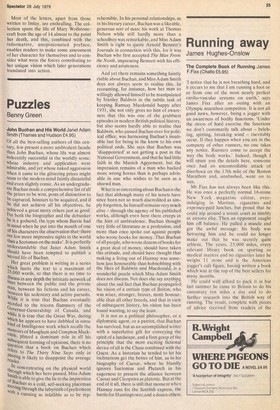Puzzles
Benny Green
John Buchan and His World Janet Adam Smith (Thames and Hudson £4.95) Of all the best-selling authors of this cen tury, few present a more ambivalent facade than John Buchan, whose life was almost indecently successful in the worldly sense, Whose industry and application were admirable, and yet whose naked aggression When it came to the glittering prizes might seem to the modern mind faintly distasteful and even slightly comic. As an undergraduate Buchan made a comprehensive list of all the prizes to be won, posts of distinction to be captured, honours to be acquired, and if he did not achieve all his objectives, he achieved a great many others just as good. For both the biographer and the debunker he is a godsend, the type whom Barrie had In mind when he put into the mouth of one of his characters the observation that ,.there are few more impressive sights in the world than a Scotsman on the make'. It is perfectly understandable that Janet Adam Smith should have been tempted to publish a second life of Buchan.
Her great problem is writing in a series ,Which limits the text to a maximum of 45,000 words, so that there is no time to iliscuss in any depth the intricate network of Ines between the public and the private In, an, between his fictions and his career, tween his sedentary and active pursuits. "hue it is true that Buchan eventually eeded to the tricorn flummery of the overnor-Generalship of Canada, and while it is true that the Great War, during neh he appears to have dabbled in some mnd of Intelligence work which recalls the Memoirs of Maugham and Compton Mackenzie, played a dominant role in all his bsequent forming of opinions, there is no rif Rion that a book on Buchan which tEers to The Thirty Nine Steps only in Passing is likely to disappoint the average reader, *in concentrating on the physical world „LorOugh which her hero passed, Miss Adam on't ..lith 'sable to give the lie to the impression _ Ei.uchan as a cold, self-seeking placeman _llt.oving through the labyrinth of preferment wIth a cunning so infallible as to be rep rehensible. In his personal relationships, as in his literary career, Buchan was a likeable, generous sort of man; his work at Thomas Nelson while still hardly more than a schoolboy was remarkable, and Miss Adam Smith is right to quote Arnold Bennett's Journals in connection with this, for it was Buchan who first accepted The Man From the North, impressing Bennett with his efficiency and astuteness.
And yet there remains something faintly risible about Buchan, and Miss Adam Smith does not always seem to realise this. In recounting, for instance, how her man so willingly allowed himself to be manipulated by Stanley Baldwin in the subtle task of keeping Ramsay Macdonald happy after 1931, she not only gives no hint of awareness that this was one of the grubbiest episodes in modern British political history, but also seems hardly able to realise that Baldwin, who passed Buchan over for political office, was harnessing Buchan's insatiable lust for being in the know to his own political ends. She says that Buchan was 'disappointed' at not getting a post in the National Government, and that he had little faith in the Munich Agreement, but the impression remains of a man who backed more wrong horses than is perhaps advisable in one who wishes to be seen as a shrewd man.
What is so interesting about Buchan is the fact that although many of his tenets have since been not so much discredited as simply forgotten, he himself remains very much. alive — through the agency of his published works, although even here there creeps in the hint of ambivalence. Buchan thought very little of literature as a profession, and more than once spoke out against people who wrote books for money. That Buchan of all people, who wrote dozens of books for a great deal of money, should have taken this attitude, and should have thought that making a living out of Hannay was somehow less honourable than hobnobbing with the likes of Baldwin and Macdonald, is a wonderful puzzle which Miss Adam Smith does not discuss. Nor does she say anything about the sad fact that Buchan propagated his vision of a certain type of Briton, who was wiser, stronger, braver, more honourable than all other breeds, and that in view of subsequent history, his vision has been found wanting, to say the least.
It is not as a political philosopher, or a diplomatic agent, or a patriot, that Buchan has survived, but as an accomplished writer with a superlative gift for conveying the spirit of a landscape, and a firm grasp of the principle that the most exciting fictional device of all is the Chase combined with the Quest. As a historian he tended to let his inclinations get the better of him, as in his biography of Caesar, where he blandly ignores Suetonius and Plutarch in his eagerness to present the alliance between Caesar and Cleopatra as platonic. But at the end of it all, there is still that moment when Hannay runs for the Scottish express, the battle for Huntingtower,and a dozen others.






































 Previous page
Previous page